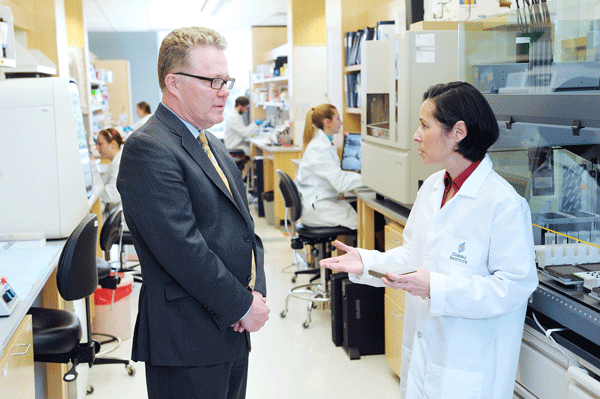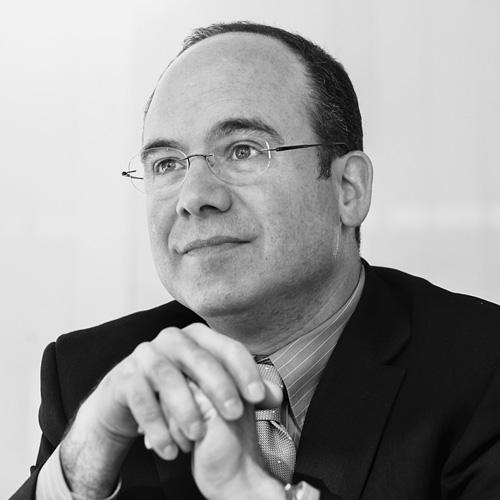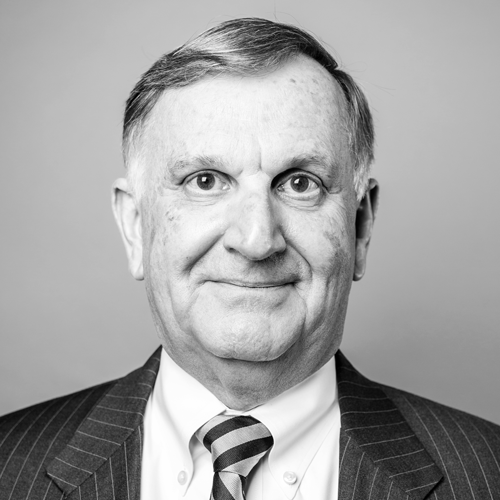When the human genome was first decoded and analyzed in 2001, it marked the culmination of a thirteen-year project that cost $3 billion. Today, that same process can be completed in approximately one day for $1,000.
This staggering breakthrough hints at a golden age of medical-science research and customized medical care.
At the forefront is the human-genome research center Coriell Institute for Medical Research, led by CEO and president Michael Christman, PhD. Christman believes that information and medical technology have, in fact, combined to dramatically advance the practical application of precision medicine.

“Until now, technical advances have outpaced our ability to interpret genetic data for individuals,” Christman says. “With the capabilities of IT and big data, we’re now at an information [age] that we only dreamed of a decade ago.”
For example, personal genetic data can be used to determine how aggressive a malignant tumor might be and what drugs will produce the most effective results. While oncologists have been among the early adopters of genetic testing, Christman predicts that pharmacogenomics, the study of how individuals are likely to respond to specific prescription drugs, will also adopt the testing in the near future. He suggests, for example, that a particular genetic signature could indicate how a drug normally used to treat kidney cancer might also be most appropriate for a specific patient’s lung cancer.
The Ethics of Progress
Christman has been fascinated by genetics and its ethical and policy implications since his graduate training at the University of California, Berkeley. That interest led him to establish the Coriell Personalized Medicine Collaborative (CPMC) in 2007, in order to conduct research and to explore issues that accompany new discoveries in the field.
The research study examines such questions regarding how and when to tell a patient about their genetic information; whether any information should be withheld from the patient, depending on personal preference; and how parental rights should be handled if undesirable traits are detected in a fetus. The CPMC has also been supportive of efforts that successfully abolished patents concerning naturally occurring genetic material (thereby lowering the cost of testing) and the implementation of the Genetic Information Nondiscrimination Act (GINA). GINA cleared the way for the use of personal genetic information in medicine and prohibited its use to deny or alter health insurance.
The CPMC study also conducts research in precision medicine. Multiple hospital partners and collaborators—such as the University of Pennsylvania, Fox Chase Cancer Center, Boston University, Stanford University, Ohio State University, and the United States Air Force—have been engaged alongside approximately 10,000 participants.
As part of a research partnership with the US Air Force, Coriell identified six genes affecting sleep duration, and also concluded:
• Air Force personnel sleep less and use sleep medication more than other study participants.
• Physicians familiar with genetics have more productive patient interactions.
• More behavioral changes are made when individuals know their genetic risks.
Christman is hopeful that recent CPMC research for the Air Force could lead to molecular insight on insomnia and improvement in the efficacy of sleep medications.
“We’re very excited that the CPMC has been advising the National Institutes of Health on its personalized medicine project, which President Obama announced in the 2015 State of the Union,” Christman says. Coriell’s goal for the NIH project is to enroll one million participants.
Supporting International Research
When Christman assumed the role of CEO and president, he introduced an induced pluripotent stem cell (iPSC) research program at Coriell. These skin cells can be reprogrammed to behave like the embryonic cells that can transform into any other type of cell found in the human body. If those cells originate from an individual with a specific condition, that condition can be replicated in a petri dish, enabling researchers to determine the efficacy of specific drugs and explore other types of research.
Coriell leveraged its expertise in iPSC to win a $10 million award from the California Institute for Regenerative Medicine to bank and distribute the world’s largest iPSC cell collection. “[By] working in partnership with Cellular Dynamics, we will be able to distribute stem cell lines for about a dozen different major disease areas to international researchers,” Christman says.
“Genetic testing provides a robust new tool for early disease detection and for maintaining a patient’s overall health. It sounds complicated and futuristic, but before long it will be part of everyone’s annual check up.”
Coriell also has a long history of biobanking, which dates back to a repository established by the National Institute of Health in 1964. Its collection of biomaterials is considered to be one of the most diverse in the world.
“We are like the Amazon of mutant cell lines and DNA and distribute to sixty-five countries annually,” Christman adds.
Genetics as Part of Routine Care
Genetic testing for Down syndrome in utero has already led to the ability to detect minuscule cancer cells in pregnant women’s blood. Though genetics will not provide a cure-all for every disease and condition, Christman predicts that it will become a regular part of many more routine screening processes and overall health maintenance.
In five to ten years, Christman says, physicians will routinely take a drop of blood from a patient to sequence the DNA in order to identify cancer and screen for the likelihood of many other diseases. Babies would even be sequenced at birth.
“Genetic testing provides a robust new tool for early disease detection and for maintaining a patient’s overall health. It sounds complicated and futuristic, but before long it will be part of everyone’s annual checkup,” he says.
In a recent study by Medco Health Solutions, 90 percent of surveyed physicians felt precision, genetics-based medicine can be very useful, but only 10 percent understood how to successfully apply it. And as Christman’s predictions come to pass, he expects Coriell to continue leading the way and answering the policy and ethical questions raised.


